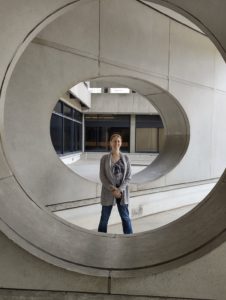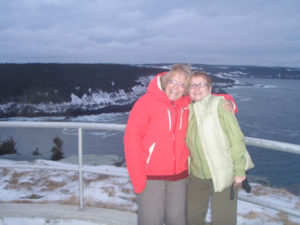 In 2015, I received an email from a newly arrived doctoral student in the Faculty of Environmental Students (now the Faculty of Environment and Urban Change), Ms. Nyssa van Vierssen Trip. Nyssa invited me to join her PhD supervisory committee, explaining that her two previous degrees were straight up Biology, but that she wanted to expand her scholarly perspective to include social sciences theory and practice.
In 2015, I received an email from a newly arrived doctoral student in the Faculty of Environmental Students (now the Faculty of Environment and Urban Change), Ms. Nyssa van Vierssen Trip. Nyssa invited me to join her PhD supervisory committee, explaining that her two previous degrees were straight up Biology, but that she wanted to expand her scholarly perspective to include social sciences theory and practice.
Since I have done collaborative research with colleagues in the social sciences and humanities for ages (decades), I naturally accepted Nyssa's invitation and jumped on board. In the intervening years, the COVID-19 pandemic, and other major life events had a severe impact Nyssa's research plans, setting her doctorate back by years.
Because I had always interacted with Nyssa since her arrival at York University (being a link to her previous Biology student incarnations), and because I am dedicated to being a "closer", whether it's a years-log unfinished knitting project, a book or a student thesis, two years ago, I became her direct PhD supervisor. I am delighted to say that after many major delays to her research, that Nyssa can see the light at the end of a long PhD tunnel. This is a testament to her resilience and dedication.
I should add a caveat, that our kind of mentor-mentee relationship is far from being the norm for members of graduate students' Supervisory Committees. These committees are theoretically designed to provide a check, and extra eyes on student progress and welfare. In practice, due to faculty work loads, the links between a graduate student and members of their Supervisory Committee are often quite perfunctory (see my reflections on Mentorship at the end of this post).
Over the years, Nyssa's PhD research has had to adapt and evolve. Here's what it's about:
Nyssa's Biography (in her own words)
Nyssa van Vierssen Trip is a PhD Candidate in the Faculty of Environment and Urban Change (EUC), York University. This bio can also be found on the Current Lab People page.
My PhD research focuses on understanding peoples’ connection to nature. To do this, I use different techniques from the sciences (statistical analysis) and humanities (text analysis).
In 2020, I published a paper in Conservation Science and Practice with collaborators, Professor Sheila Colla (York University), Dr. Victoria MacPhail (York University) and Ms. Beatrice Olivastri (Friends of the Earth, Canada). We found that Canadians are highly engaged in native pollinator conservation and want the federal and provincial governments to take the lead in conservation efforts.
I am currently exploring how environmental policy evolves, by looking at how global environmental advocacy organizations discuss nature conservation from different biological, economic and social angles. I am also interested in understanding how people engage with social media to talk about their local city park.
Before starting on my interdisciplinary path at York University, I began my academic career in biology. I hold a bachelor’s degree in Biology from Carleton University (Ottawa) and a master’s degree in Biology from Memorial University (St. John’s).
Since joining York University as a doctoral student, I have had a chance to gain experience as a course director. In 2017, I taught a third-year Faculty of Environmental Studies course in Landscape Ecology. I have worked as a Teaching Assistant (TA) in home faculty EUC and the faculty of science, Biology and Natural Sciences.
Twitter: @TripNyssa Google Scholar Profile: https://scholar.google.com/citations?user=meuvmtQAAAAJ&hl=en
Back to Dawn's reflections: The Past is so very often Prologue
I don't think it's possible for professors to reflect enough on our potential and actual impacts on the lives of students who meet us, via our lectures and talks at other universities, at conferences, or our social media presence.
I'm often asked to comment on mentorship, including about the role of the many mentors who have advised me at key moments in my life and academic career. I always advise students to find as many different kinds of mentors as possible, to talk to them and TO LISTEN.
I comment much less frequently on how I have handled my own role as a mentor. I have had formal mentorship training, which has helped me to always be aware of my professorial power, privilege, impact and influence: you never know where your influence may be landing.
Nyssa is a case in point. Several months after I joined Nyssa's committee, I was reading her mandatory statement describing her motivations for why she landed on a non-Biology PhD programme. As I read, I realized that the un-named Memorial University Biology seminar speaker who influenced her decision to move out of her comfort zone of Biology, and into an uncomfortable interdisciplinary research space for a doctorate, was actually ME!
 So, Nyssa's journey to my lab actually began in 2012, when my friend and colleague, (now) Professor Emerita Luise Hermanutz (right) invited me to give a series of talks and course lectures at Memorial University in Newfoundland. I gave a Biology department seminar, "Why don't ecologists get more respect", to a packed room on a Friday afternoon. Nyssa was in that room, and she listened. We have had a connection for ten years but were not aware of it for the first four years, because Nyssa had not remembered the name of the Seminar Speaker, only the content of the talk. I recognized it when I read her Student Statement for her faculty programme (FES, now EUC).
So, Nyssa's journey to my lab actually began in 2012, when my friend and colleague, (now) Professor Emerita Luise Hermanutz (right) invited me to give a series of talks and course lectures at Memorial University in Newfoundland. I gave a Biology department seminar, "Why don't ecologists get more respect", to a packed room on a Friday afternoon. Nyssa was in that room, and she listened. We have had a connection for ten years but were not aware of it for the first four years, because Nyssa had not remembered the name of the Seminar Speaker, only the content of the talk. I recognized it when I read her Student Statement for her faculty programme (FES, now EUC).
Yikes! With power comes responsibility.
ps Here is an Open Access Link to a later iteration of my talk for Memorial University in January 2012

